Best Physiotherapy for Spinal Cord Injury You Can Trust
Trust “Best Physiotherapy for Spinal Cord Injury” for tailored rehabilitation, integrating evidence-based techniques to maximize recovery and restore independence. Our compassionate care and dedicated support aim to guide stroke survivors towards improved mobility and quality of life.
Best Spinal Cord Injury physiotherapy Doctors in Delhi, India
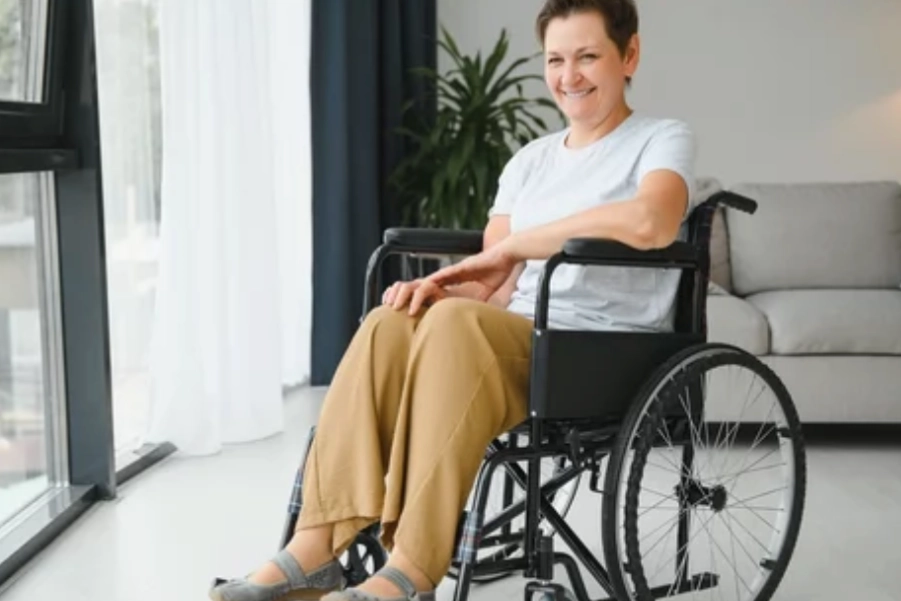
Physiotherapy for Spinal Cord Injury
Spinal Cord Injury Physiotherapy in Delhi
Physiotherapy for spinal cord injury aims to maximize function and independence. It includes exercises to improve strength, flexibility, and mobility, as well as techniques for managing spasticity and preventing secondary complications. Adaptive strategies and assistive devices are also utilized to optimize the individual’s ability to perform daily activities.
What is Spinal Cord Injury
Spinal cord injury (SCI) refers to damage to the spinal cord resulting in loss of sensation, muscle function, or both. Causes include trauma, such as accidents or falls, or non-traumatic events like infections or tumors. SCI can lead to varying degrees of paralysis and impairment in bodily functions.
Spinal cord injuries can result from various causes, including:
Traumatic incidents such as car accidents, falls, sports injuries, or violence.Non-traumatic events like diseases (e.g., cancer, infections), degenerative conditions (e.g., spinal stenosis), or surgical complications.
Medical conditions like spinal cord tumors or vascular disorders (e.g., spinal cord infarction).
Traumatic incidents
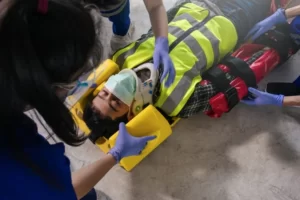
Traumatic incidents such as car accidents, falls, sports injuries, or violence.
Non-traumatic events
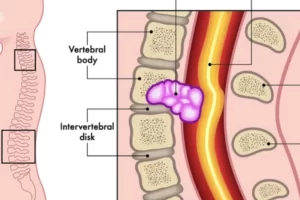
Non-traumatic events like diseases (e.g., cancer, infections), or surgical complications.
Medical conditions
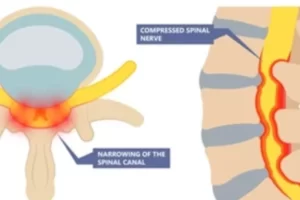
Medical conditions like spinal cord tumors or vascular disorders (e.g., spinal cord infarction).
Understanding Spinal Cord Injury
Type of Spinal Cord Injury
Types of Spinal Cord Injuries Spinal cord injuries are classified into several types, with paraplegia and tetraplegia being the most common. The level and severity of injury determine the extent of functional impairment.
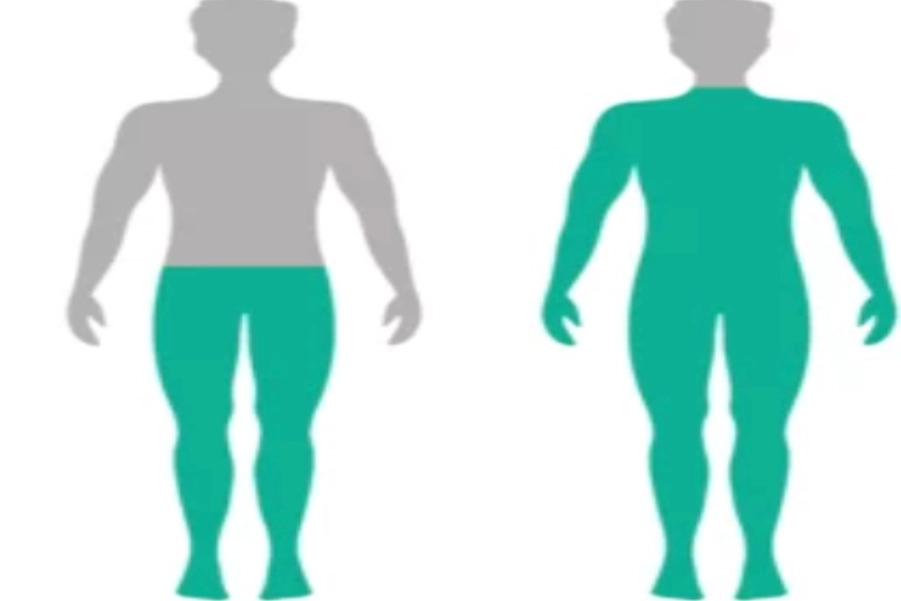
Various Syndrome due to spinal cord injury
Anterior cord syndrome: Characterized by damage to the front (anterior) portion of the spinal cord, resulting in loss of motor function, pain and temperature sensation, while preserving proprioception and vibration sensation.
Posterior cord syndrome: Involves damage to the back (posterior) portion of the spinal cord, leading to loss of proprioception and vibration sensation, while motor function and pain sensation remain intact.
Central cord syndrome: Typically caused by injury to the central portion of the spinal cord, resulting in disproportionately greater impairment in the arms compared to the legs, along with variable sensory deficits.
Brown-Séquard syndrome: Results from damage to one half of the spinal cord, leading to ipsilateral (on the same side) motor weakness and loss of proprioception, and contralateral (on the opposite side) loss of pain and temperature sensation.
Cauda equina syndrome: Condition that occurs when the bundle of nerves at the lower end of the spinal cord, called the cauda equina, becomes compressed, it can cause include severe low back pain, weakness or numbness in one or both legs, numbness in the groin or genital area, bladder or bowel dysfunction, and loss of sensation in the buttocks or inner thighs.
Rehabilitation After Spinal Cord injury
Spinal cord injury rehabilitation focuses on restoring function and independence. Through tailored therapies, including physical, occupational, and recreational interventions, it aims to optimize mobility and quality of life.
Rehabilitation and Physiotherapy for spinal cord injury
Rehabilitation following a spinal cord injury (SCI) is a crucial aspect of the recovery process, aimed at maximizing independence, restoring function, and enhancing overall quality of life for individuals affected by this life-changing condition. A comprehensive rehabilitation program for SCI typically encompasses various therapeutic interventions and support services tailored to the individual’s specific needs, functional goals, and level of injury. Here’s an overview of key components of rehabilitation after spinal cord injury:
Medical Management and Stabilization:
The initial phase of rehabilitation involves medical stabilization and management to address any acute complications and prevent further damage to the spinal cord. This may include surgery, medication, and monitoring for complications such as infections or pressure ulcers.
Physiotherapy:
Physiotherapy plays a central role in SCI rehabilitation, focusing on improving strength, flexibility, mobility, and overall physical function. Therapists use a combination of exercises, stretching techniques, and specialized equipment to help individuals regain movement and adapt to their new physical abilities.
Occupational Therapy:
Occupational therapists work with individuals to develop skills and strategies for performing activities of daily living (ADLs) independently. This may include tasks such as dressing, grooming, bathing, and cooking, as well as adaptive techniques and assistive devices to promote independence.
Mobility Training:
Learning to navigate the environment with a wheelchair or other mobility aids is essential for individuals with SCI. Mobility training includes techniques for wheelchair propulsion, transfers, and navigating obstacles, as well as strategies for community mobility and transportation.
Assistive Technology:
Assistive devices and technology play a crucial role in SCI rehabilitation, helping individuals compensate for lost function and enhance independence. This may include wheelchairs, orthotic devices, environmental control systems, and adaptive computer technologies tailored to individual needs.
Functional Electrical Stimulation (FES):
FES is a therapeutic technique that uses electrical stimulation to activate paralyzed muscles and restore movement. It can be used to improve muscle strength, circulation, and function in individuals with SCI, facilitating activities such as standing, walking, and grasping objects.
Bladder and Bowel Management:
SCI often results in changes to bladder and bowel function, requiring specialized management techniques. Rehabilitation programs include education, training, and strategies for bladder and bowel care to prevent complications and promote continence.
Pain Management:
Chronic pain is common after SCI and can significantly impact quality of life. Rehabilitation programs may incorporate various pain management techniques, including medication, physical therapy, relaxation techniques, and psychological interventions to help individuals manage pain effectively.
Psychological Support:
Coping with the physical, emotional, and lifestyle changes associated with SCI can be challenging. Psychological support, counseling, and peer support groups provide opportunities for individuals and their families to address emotional concerns, develop coping strategies, and adjust to life with SCI.
Community Reintegration:
As individuals progress in their rehabilitation journey, emphasis is placed on community reintegration and participation in meaningful activities. This may involve vocational counseling, educational support, recreational therapy, and access to community resources to facilitate social engagement and participation.
Overall, rehabilitation after spinal cord injury is a comprehensive and multidisciplinary process that addresses physical, functional, emotional, and social aspects of recovery. By providing individualized care, support, and resources, rehabilitation programs aim to optimize outcomes and empower individuals with SCI to lead fulfilling and independent lives.
Physiotherapy Treatment for Spinal Cord Injury
Physiotherapy for spinal cord injury aims to improve mobility, strength, and function. Through tailored exercises, manual therapy, and assistive devices, it enhances independence and quality of life for individuals with spinal cord injury.
Rehabilitation technology in spinal cord injury rehab aids mobility and function. Devices like exoskeletons, FES, and virtual reality enhance therapy, promoting neuroplasticity and independence in daily activities.
Expected Functional Outcome of Rehabilitation
Functional outcomes following spinal cord injury rehabilitation vary depending on factors like injury severity and individual goals. Rehabilitation aims to maximize independence in activities of daily living, mobility, and quality of life. Some achieve significant functional gains, while others may experience limitations. However, with comprehensive therapy, assistive devices, and ongoing support, many individuals with spinal cord injury can achieve improved function, autonomy, and community integration, enhancing their overall well-being.
Why Choose Us
Why Choose Dr. Dharam Pandey and Team?
Dr. Dharam Pandey is a trailblazer in the field of neurorehabilitation, with over two decades of experience in neurological rehabilitation and a passion for improving the lives of his patients. He is highly qualified in neurological physiotherapy and rehabilitation, and his expertise spans the spectrum of neurological rehabilitation care, from acute to long-term rehabilitation. Dr. Pandey is known for his compassionate approach, personalized treatment plans, and unwavering dedication to achieving optimal outcomes for every patient under his care.
Meet Dr. Dharam Pandey
Meet Dr. Dharam Pandey and Team: Leaders in Advanced neurorehabilitation
- 22+ Years of experience
- Highly Equipped Clinic
- Good quality care & service
Meet Dr. Dharam Pandey and Team
Leaders in Advanced Neurological Rehabilitation
At Dr. Dharam Pandey and Team, we are dedicated to revolutionizing Neurological Rehabilitation through cutting-edge technology, personalized care, and a commitment to delivering exceptional outcomes. Led by Dr. Dharam Pandey, a renowned expert in neurorehabilitation, our team is equipped with state-of-the-art facilities and staffed by highly qualified professionals. We specialize in outcome-based functional task training therapy, harnessing the power of advanced technology to optimize recovery for patients.
State-of-the-Art Facilities
Our facilities are equipped with the latest technology and amenities to create a conducive environment for rehabilitation and healing. From spacious therapy gyms to private treatment rooms, we prioritize comfort, safety, and accessibility for our patients.
EXPERTISE
Led by Dr. Dharam Pandey, our team comprises highly skilled professionals with extensive experience in stroke rehabilitation.
PERSONALIZED CARE
We believe in a patient-centered approach, tailoring treatment plans to address the individual needs and goals of each patient.
ADVANCED TECHNOLOGY
We harness the power of advanced technology to deliver innovative rehabilitation solutions and optimize outcomes.
COMPASSIONATE SUPPORT
We provide compassionate, supportive care every step of the way, empowering patients to achieve their full potential.
Best Physiotherapy FOR spinal cord injury
At Dr. Dharam Pandey and Team, we are committed to redefining the standard of care in neurological rehabilitation. With our expertise, state-of-the-art technology, and unwavering dedication to patient-centric care, we strive to inspire hope, restore function, and improve quality of life for head injury survivors. If you or a loved one is seeking specialized rehabilitation services, we invite you to experience the difference at Dr. Dharam Pandey and Team.
Our Treatment Process
Committed To Keep People Healthy & Safe
Our treatment process begins with a thorough assessment, followed by the creation of a personalized plan tailored to your needs. Through active rehabilitation, incorporating various evidence-based techniques, we work to promote healing and improve function. Continuous support and guidance are provided to ensure long-term success.
We start by having a thorough conversation with you about your medical history and any issues you’re experiencing. This helps us understand your unique situation.
We use state-of-the-art software and technology to analyze how your body moves and functions. This gives us a detailed picture of what might be causing your discomfort.
Based on what we find during the assessment, we create a personalized plan just for you. Our goal is to help you achieve specific outcomes, whether it’s reducing pain, improving mobility, or something else.
During your sessions with us, we use a combination of advanced technology and hands-on techniques to address your needs. This might include using special equipment or providing manual therapy to target problem areas.
We keep a close eye on how you’re doing throughout your treatment. By regularly checking your progress, we can make sure you’re on the right track and make any necessary adjustments to your plan.
Once you’ve made significant progress and reached your goals, we’ll guide you through a final session. Here, we’ll provide you with a customized digital exercise program that you can continue at home.
Even after your sessions with us are complete, we’re still here to support you. We offer virtual and online follow-up appointments to check in, answer any questions you may have, and provide ongoing guidance as needed.
At Best Physiotherapy Centre in Delhi We Follow Best Practices
Why Choose Us
We offer personalized care, crafting customized treatment plans based on your unique needs and goals. With expertise in physiotherapy and a holistic approach to healing, our team ensures comprehensive care that addresses both physical and emotional aspects of recovery.
- Personalized Care
- Experienced Professionals
- Expertise & Best Practices
- Holistic Approach
- Latest Technology
Frequently Asked Questions
Reach out to us if you have further Questions - We're here to help!
Q1: Can a person with a spinal cord injury regain mobility?
Recovery varies among individuals and depends on factors like the level and severity of the injury. Rehabilitation and adaptive strategies can significantly improve mobility.
Q2: Is spinal cord injury rehabilitation a long-term process?
Rehabilitation is often a lifelong endeavor, as individuals adapt to their injury and work towards optimizing their quality of life.
Q3: Can children with spinal cord injuries undergo rehabilitation?
Yes, children with spinal cord injuries can benefit from rehabilitation tailored to their needs, ensuring they achieve their highest level of function.
Q4: Are there promising advancements in spinal cord injury rehabilitation?
Researchers are continually exploring innovative treatments and technologies, offering hope for the future of spinal cord injury rehabilitation.
Q5: How important is the role of family support in SCI rehabilitation?
Family support is invaluable and plays a critical role in the emotional and physical recovery of individuals with spinal cord injuries.
Spinal cord injuries present unique challenges that require a comprehensive and multidisciplinary approach to rehabilitation. With the aid of dedicated healthcare professionals, adaptive techniques, and a strong support system, individuals with spinal cord injuries can embark on a journey towards regaining independence, mobility, and an improved quality of life. By exploring the world of spinal cord injury rehabilitation, understanding its phases, and embracing innovative techniques, those affected by SCI can look forward to a future filled with hope and possibilities.
Note: Content provided here is for informational purposes only and is not a substitute for professional medical advice or diagnosis. If you believe you are experiencing pain or any other health-related issue, it is important to seek the advice of qualified healthcare professionals for a proper evaluation and treatment plan.
Call Today
+91-9818911195 +91-9818910029


